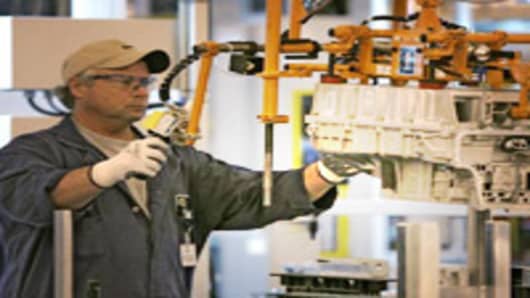Among all the problems the European debt crisis pose to the global economy comes one possible benefit: A much-needed lift for American manufacturers.
Earnings for large companies like 3M and United Technologies glistened in the first quarter, thanks in good part to bustling domestic business and some shield from the foreign turmoil.
The growth in manufacturing, in turn, could help keep gross domestic product from plummeting to the recession levels being seen in Europe. U.S. companies are far less dependent on trade for GDP growth, so a downtrodden European consumer isn't as vital to American expansion.
The U.S. government releases its initial GDP estimate for the first quarter Friday morning, with economists expecting a gain of about 2.6 percent.
"The net effect is a growth cycle that is likely to favor U.S. sectors such as manufacturing," strategists at Bank of America Merrill Lynch said in a research note. "The US manufacturing sector may benefit from the wage constraint, cheap resources and inexpensive working capital that the post-credit crunch world provides."
For investors, the trend is worth watching particularly as industrials and materials both have been solid performers in this year's strong stock market gains, but have underperformed slightly overall. The industrial sector ranks fourth of the Standard & Poor's 500's 10 sectors, slightly beneath the index's 10.5 percent rise in 2012, while materials have performed slightly better but still below the index's returns.
"Stocks can perform well in this environment but US manufacturing and (emerging market) consumer will likely outperform commodity and infrastructure theme," BofA said.
To be sure, there are impediments to manufacturing growth.
The latest reading on durable goodsorders registered a 4.2 percent drop, weighed particularly by a drop in volatile aircraft orders as well as metals, computers a host of other important goods. However, economists cautioned that revisions and seasonal distortions affected the numbers.
In addition, manufacturing reports have showed somewhat decreasing activity in the U.S., but much sharper downturnsin Europe, where the Purchasing Managers Indexes showed clearly recessionary readings.
"We're continually decoupling from Europe," said Nadav Baum, executive vice president at BPU Investment Management in Pittsburgh. "The manufacturing side is really starting to bring things to light."
Baum said he is adding positions in General Electric — a minority owner in CNBC.com-parent NBC Universal — for the first time since the financial crisis began.
"The Wall Street pundits are always looking for leadership. Technology has been a leader for a long time, but if you're looking for a sector, I like the rolling up the sleeves and going back to work theme," he said.
Playing the Europe-U.S. economic dichotomy as a zero-sum game, in which one gains at the other's expense, is tricky given how interconnectedness between the two country's financial systems.
However, some, including banking analyst Dick Bove, think the business the European banks lose as they need to recapitalize their losses during the debt crisis will help American institutions.
Neil Prothero, economist at the Economist Intelligence Unit, also sees the willingness of U.S. banks to provide credit to business as an important catalyst.
"One of the main differences between the U.S. and Europe is the whole sentiment toward the banking sector," Prothero said. "Good or bad, the U.S. financial sector is a bit more stabilized and a bit more open to growing in terms of providing credit."
European GDP is likely to contract by 0.7 percent this year, posing further risks and making the U.S. economy, at least by comparison, seem strong, he added.
"I'm not quite as bullish on the US. But we're more bullish on the U.S. than the European economy," he said. "The risks (in Europe) are severely on the down side as far as we can see."
In the U.S., that could mean opportunity for investors who believe in the manufacturing theme.
"We're starting to retool, we're getting back to the basics and the U.S. is starting to do more manufacturing," Baum said. "That's going to be a continuing theme."




